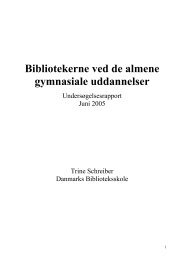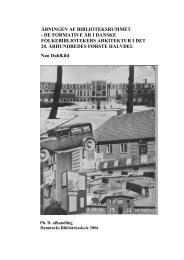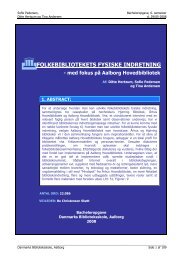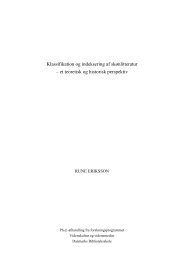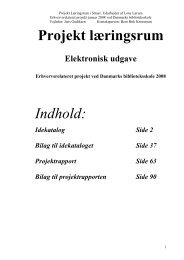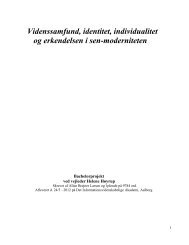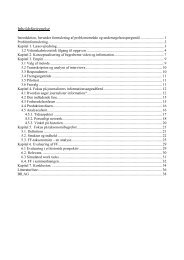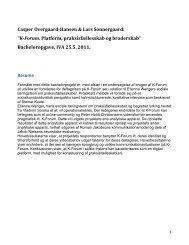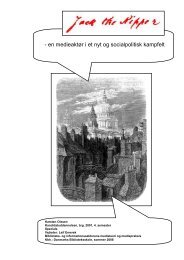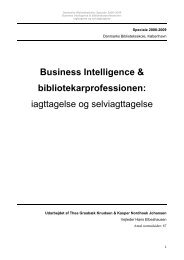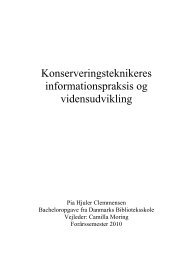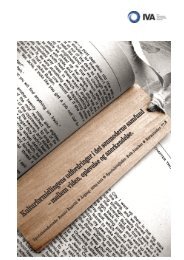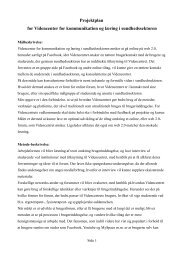how to detect misinformation on the internet
how to detect misinformation on the internet
how to detect misinformation on the internet
You also want an ePaper? Increase the reach of your titles
YUMPU automatically turns print PDFs into web optimized ePapers that Google loves.
Internati<strong>on</strong>al C<strong>on</strong>ference <strong>on</strong> Internet Studies,<br />
September 7-8, 2013, H<strong>on</strong>g K<strong>on</strong>g, China<br />
CLIMBING MOUNT DEPENDABLE:<br />
HOW TO DETECT MISINFORMATION ON THE INTERNET<br />
Associate Professor Jeppe Nicolaisen,<br />
Royal School of Library and Informati<strong>on</strong> Science, Denmark<br />
jni@iva.dk<br />
ABSTRACT<br />
The open nature of <strong>the</strong> Internet makes it vulnerable <str<strong>on</strong>g>to</str<strong>on</strong>g> <str<strong>on</strong>g>misinformati<strong>on</strong></str<strong>on</strong>g>. When seeking and<br />
browsing <strong>the</strong> Internet it is <strong>the</strong>refore important <str<strong>on</strong>g>to</str<strong>on</strong>g> check <strong>the</strong> validity of retrieved informati<strong>on</strong>.<br />
Various techniques have been proposed for critically assessing Internet sources and<br />
informati<strong>on</strong>. The paper presents and reviews two of <strong>the</strong>se: <strong>the</strong> checklist method and<br />
comparative evaluati<strong>on</strong>. The checklist method is found <str<strong>on</strong>g>to</str<strong>on</strong>g> be <str<strong>on</strong>g>to</str<strong>on</strong>g>o inc<strong>on</strong>sistent <str<strong>on</strong>g>to</str<strong>on</strong>g> adequately<br />
functi<strong>on</strong> as a dependable technique. Comparative evaluati<strong>on</strong> is found <str<strong>on</strong>g>to</str<strong>on</strong>g> be a more dependable<br />
technique if supplemented with knowledge about document typology and <strong>the</strong> so-called<br />
authority hierarchy. Using a real example from actual informati<strong>on</strong> seeking <strong>on</strong> <strong>the</strong> Internet, <strong>the</strong><br />
paper s<str<strong>on</strong>g>how</str<strong>on</strong>g>s <str<strong>on</strong>g>how</str<strong>on</strong>g> <str<strong>on</strong>g>to</str<strong>on</strong>g> <str<strong>on</strong>g>detect</str<strong>on</strong>g> <str<strong>on</strong>g>misinformati<strong>on</strong></str<strong>on</strong>g> using knowledge about document typology and<br />
comparative evaluati<strong>on</strong>.<br />
We cannot direct <strong>the</strong> wind,<br />
but we can adjust <strong>the</strong> sails.<br />
Bertha Calloway<br />
1. INTRODUCTION<br />
The Internet is truly fantastic. At <strong>the</strong> World Wide Web we can get in c<strong>on</strong>tact with people from<br />
all over <strong>the</strong> world and with fellow people who share our interests. We can search and find<br />
informati<strong>on</strong> about all kinds of <str<strong>on</strong>g>to</str<strong>on</strong>g>pics. We can learn about new things, more about things we<br />
already know something about, and thus become more informed and knowledgeable about <strong>the</strong><br />
world we live in. Moreover, we can also participate ourselves with our own knowledge and<br />
ideas. We can produce homepages, join <strong>the</strong> <strong>on</strong>going debate <strong>on</strong> discussi<strong>on</strong> forums and <strong>on</strong><br />
social networks, create our own blogs, edit pages <strong>on</strong> Wikipedia, etcetera, etcetera. In short:<br />
The Internet is truly fantastic!<br />
The Internet is distinctively a democratic medium. If you have a device with Internet access<br />
you can in principle join and participate. This openness is a huge plus. That all in principle<br />
can join and participate in <strong>the</strong> <strong>on</strong>going discussi<strong>on</strong> makes it possible for many views and<br />
arguments <str<strong>on</strong>g>to</str<strong>on</strong>g> be heard. However, this openness comes at a price: Misinformati<strong>on</strong>. There are,<br />
unfortunately, many examples of <str<strong>on</strong>g>misinformati<strong>on</strong></str<strong>on</strong>g> <strong>on</strong> <strong>the</strong> Internet having caused more or less<br />
fatal c<strong>on</strong>sequences. Am<strong>on</strong>g <strong>the</strong> lighter and fun <strong>on</strong>es is <strong>the</strong> politician from New Zealand who<br />
demanded a <str<strong>on</strong>g>to</str<strong>on</strong>g>tal ban <strong>on</strong> dihydrogen m<strong>on</strong>oxide [1]. On <strong>the</strong> Internet she had learned that this<br />
1
substance is extremely pois<strong>on</strong>ous and dangerous. Dihydrogen m<strong>on</strong>oxide is, <str<strong>on</strong>g>how</str<strong>on</strong>g>ever, <strong>the</strong><br />
chemical name for plain and simple water (H 2 O). Ano<strong>the</strong>r amusing example is <strong>the</strong> sports<br />
journalist from a British newspaper who traveled <str<strong>on</strong>g>to</str<strong>on</strong>g> Cyprus <str<strong>on</strong>g>to</str<strong>on</strong>g> cover a soccer match between a<br />
Cypriote and an English team. In <strong>the</strong> article he wrote <str<strong>on</strong>g>to</str<strong>on</strong>g> his newspaper he reported am<strong>on</strong>g<br />
o<strong>the</strong>r things that <strong>the</strong> Cypriote fans were known as <strong>the</strong> ‘Zany Ones’ and that <strong>the</strong>y wore hats<br />
made from shoes. Later, it was proven that <strong>the</strong> journalist in questi<strong>on</strong> had gotten <strong>the</strong><br />
informati<strong>on</strong> not from meeting <strong>the</strong> fans himself, but from a page <strong>on</strong> Wikipedia that had been<br />
edited by rivaling fans [2].<br />
There are, <str<strong>on</strong>g>how</str<strong>on</strong>g>ever, also examples of <str<strong>on</strong>g>misinformati<strong>on</strong></str<strong>on</strong>g> having caused severe injury and even<br />
death [3]. Medical <str<strong>on</strong>g>misinformati<strong>on</strong></str<strong>on</strong>g> <strong>on</strong> <strong>the</strong> Internet has thus led <str<strong>on</strong>g>to</str<strong>on</strong>g> severe c<strong>on</strong>sequences for a<br />
number of people having followed advice <strong>on</strong> self-medicati<strong>on</strong> found <strong>on</strong> various Internet sites.<br />
As an informati<strong>on</strong> seeker and user of <strong>the</strong> Internet it is c<strong>on</strong>sequently important or even vital <str<strong>on</strong>g>to</str<strong>on</strong>g><br />
keep in mind that not all informati<strong>on</strong> searched and found is accurate and true. One should of<br />
course always meet new ideas and informati<strong>on</strong> with a sound porti<strong>on</strong> of skepticism – not just<br />
<strong>on</strong> <strong>the</strong> Internet [4, 5]. However, a vital difference between <strong>the</strong> Internet and traditi<strong>on</strong>al media<br />
like books, newspapers, journals, and magazines, is that peer review and quality c<strong>on</strong>trol is<br />
often absent <strong>on</strong> <strong>the</strong> Internet. Informati<strong>on</strong> <strong>on</strong> <strong>the</strong> Internet has in o<strong>the</strong>r words <strong>on</strong>ly very<br />
infrequently g<strong>on</strong>e through <strong>the</strong> same instances of quality c<strong>on</strong>trol as e.g. a book published by an<br />
esteemed publisher or like papers published by academic presses. One should c<strong>on</strong>sequently<br />
stay even more alert <str<strong>on</strong>g>to</str<strong>on</strong>g> <strong>the</strong> informati<strong>on</strong> picked up <strong>on</strong> <strong>the</strong> Internet. The aim of this paper is <str<strong>on</strong>g>to</str<strong>on</strong>g><br />
present and discuss various techniques for separating <strong>the</strong> weed from <strong>the</strong> chaff when browsing<br />
and seeking <strong>the</strong> Internet. Such techniques are sometimes referred <str<strong>on</strong>g>to</str<strong>on</strong>g> as techniques for source<br />
criticism. However, in order <str<strong>on</strong>g>to</str<strong>on</strong>g> become a true expert in source criticism, this paper will argue<br />
that additi<strong>on</strong>al knowledge and expertise in document typology is also needed. Different types<br />
of documents play different kinds of roles in <strong>the</strong> global communicati<strong>on</strong> system – or perhaps<br />
more precise, <strong>the</strong>y c<strong>on</strong>duct different functi<strong>on</strong>s with varying degrees of authority. Knowledge<br />
about <strong>the</strong>se elements is essential in order <str<strong>on</strong>g>to</str<strong>on</strong>g> be able <str<strong>on</strong>g>to</str<strong>on</strong>g> navigate safely <strong>on</strong> <strong>the</strong> Internet. A<br />
secti<strong>on</strong> <strong>on</strong> document typology and authority c<strong>on</strong>sequently follows <strong>the</strong> secti<strong>on</strong> <strong>on</strong> techniques<br />
for source criticism. The paper ends with an example of <str<strong>on</strong>g>how</str<strong>on</strong>g> <str<strong>on</strong>g>to</str<strong>on</strong>g> use techniques for source<br />
criticism and knowledge about document typology <str<strong>on</strong>g>to</str<strong>on</strong>g> assess <strong>the</strong> accuracy of a knowledge<br />
claim found <strong>on</strong> <strong>the</strong> Internet: The so-called open-access advantage postulate.<br />
2. TECHNIQUES<br />
2<br />
Seek not greatness, but seek truth<br />
and you will find both.<br />
Horace Mann<br />
There are various techniques for source criticism available <str<strong>on</strong>g>to</str<strong>on</strong>g> <strong>the</strong> serious informati<strong>on</strong> seeker.<br />
We will start by examining <strong>the</strong> so-called checklist method and later move <strong>on</strong> <str<strong>on</strong>g>to</str<strong>on</strong>g> examine <strong>the</strong><br />
so-called comparative evaluati<strong>on</strong> method.<br />
2.1 Checklists<br />
In short, <strong>the</strong> checklist method simply instructs <strong>the</strong> searcher <str<strong>on</strong>g>to</str<strong>on</strong>g> evaluate <strong>the</strong> source in questi<strong>on</strong><br />
by comparing <strong>the</strong> source <str<strong>on</strong>g>to</str<strong>on</strong>g> a list of questi<strong>on</strong>s formulated as a checklist. The answers <str<strong>on</strong>g>to</str<strong>on</strong>g> <strong>the</strong>se<br />
questi<strong>on</strong>s are thus believed <str<strong>on</strong>g>to</str<strong>on</strong>g> indicate <str<strong>on</strong>g>to</str<strong>on</strong>g> what extent <strong>the</strong> searcher may trust <strong>the</strong> informati<strong>on</strong>
provided by <strong>the</strong> source in questi<strong>on</strong>. There exist many checklists [6]. They are typically<br />
provided by libraries and informati<strong>on</strong> centers in an attempt <str<strong>on</strong>g>to</str<strong>on</strong>g> help <strong>the</strong>ir users <str<strong>on</strong>g>to</str<strong>on</strong>g> navigate <strong>the</strong><br />
Internet more safely. Although <strong>the</strong>re is no agreed up<strong>on</strong> standard, most checklists seem <str<strong>on</strong>g>to</str<strong>on</strong>g> be<br />
addressing more or less <strong>the</strong> same categories of questi<strong>on</strong>s. Typically <strong>the</strong>se categories include:<br />
<br />
<br />
<br />
<br />
<br />
Questi<strong>on</strong>s <strong>on</strong> authority<br />
Questi<strong>on</strong>s <strong>on</strong> accuracy<br />
Questi<strong>on</strong>s <strong>on</strong> objectivity<br />
Questi<strong>on</strong>s <strong>on</strong> currency<br />
Questi<strong>on</strong>s <strong>on</strong> coverage<br />
Within each category a number of questi<strong>on</strong>s are asked. Zooming in <strong>on</strong> <strong>the</strong> questi<strong>on</strong>s <strong>on</strong><br />
authority, <strong>the</strong>se are <strong>the</strong> typical questi<strong>on</strong>s:<br />
<br />
<br />
<br />
<br />
<br />
Who is <strong>the</strong> author?<br />
What are his or her qualificati<strong>on</strong>s?<br />
Is <strong>the</strong> author affiliated with an instituti<strong>on</strong>?<br />
Are <strong>the</strong>re c<strong>on</strong>tact informati<strong>on</strong>?<br />
Are <strong>the</strong>re advertisements and/or sp<strong>on</strong>sor influence?<br />
The rati<strong>on</strong>ale behind <strong>the</strong>se questi<strong>on</strong>s is that if an author is willing <str<strong>on</strong>g>to</str<strong>on</strong>g> put his or her name <strong>on</strong><br />
<strong>the</strong> source, and if it is even possible <str<strong>on</strong>g>to</str<strong>on</strong>g> <str<strong>on</strong>g>detect</str<strong>on</strong>g> that s/he has qualificati<strong>on</strong>s in <strong>the</strong> area that make<br />
him or her a trustworthy authority <strong>on</strong> <strong>the</strong>se matters – maybe even is affiliated with a<br />
h<strong>on</strong>orable instituti<strong>on</strong> – <strong>the</strong>n we may trust <strong>the</strong> source and its informati<strong>on</strong> <str<strong>on</strong>g>to</str<strong>on</strong>g> a larger extent than<br />
if not (especially if <strong>the</strong> page is free from advertisements and sp<strong>on</strong>sor influence).<br />
Undoubtedly, <strong>the</strong> checklist method can catch some sources that c<strong>on</strong>sciously or unc<strong>on</strong>sciously<br />
misinform <strong>the</strong>ir readers. Yet, <strong>the</strong> method is not error free. It lets <str<strong>on</strong>g>to</str<strong>on</strong>g>o many sources through<br />
that should not be trusted, and c<strong>on</strong>versely s<str<strong>on</strong>g>to</str<strong>on</strong>g>ps <str<strong>on</strong>g>to</str<strong>on</strong>g>o many sources that actually are quite<br />
reliable. One example of such a source that slips through <strong>the</strong> eye of <strong>the</strong> needle of most<br />
checklists is <strong>the</strong> homepage entitled ‘Martin Lu<strong>the</strong>r King Jr. – A True His<str<strong>on</strong>g>to</str<strong>on</strong>g>rical examinati<strong>on</strong>’.<br />
It is located at www.martinlu<strong>the</strong>rking.org, and c<strong>on</strong>tains a number of texts about Martin Lu<strong>the</strong>r<br />
King. One of <strong>the</strong> texts is a resource guide for students writing reports about King, and <strong>on</strong>e of<br />
<strong>the</strong> links in <strong>the</strong> guide is a link <str<strong>on</strong>g>to</str<strong>on</strong>g> a two-page article entitled ‘The Beast as Saint’. The main<br />
points of <strong>the</strong> article may be summarized quoting a few lines from <strong>the</strong> article:<br />
“Well friends, he is not a legitimate reverend, he is not a b<strong>on</strong>a fide PhD, and his<br />
name isn’t really "Martin Lu<strong>the</strong>r King, Jr." What's left? Just a sexual degenerate,<br />
an America-hating Communist, and a criminal betrayer of even <strong>the</strong> interests of his<br />
own people” [7].<br />
The article ends with a lists of references used in <strong>the</strong> text and c<strong>on</strong>tact informati<strong>on</strong> (<strong>the</strong> author<br />
and his homepage). Despite ‘Martin Lu<strong>the</strong>r King Jr. – A True His<str<strong>on</strong>g>to</str<strong>on</strong>g>rical examinati<strong>on</strong>’ scores<br />
high <strong>on</strong> most checklists (it is located <strong>on</strong> a dependable .org-address, we can find c<strong>on</strong>tact<br />
informati<strong>on</strong>, we can find references <str<strong>on</strong>g>to</str<strong>on</strong>g> cited works in <strong>the</strong> text, etc.), most people would<br />
definitely assess <strong>the</strong> source <str<strong>on</strong>g>to</str<strong>on</strong>g> be straight out untrustworthy after just little more detailed<br />
inspecti<strong>on</strong>.<br />
3
Ano<strong>the</strong>r problem with most checklists was pointed out first by Marc Meola [8]. Often, when<br />
dealing with <strong>the</strong> questi<strong>on</strong>s <strong>on</strong> accuracy, <strong>the</strong> checklists ask:<br />
<br />
Is <strong>the</strong> informati<strong>on</strong> reliable and error-free?<br />
As noted by Meola, this questi<strong>on</strong> is at best a little naïve. To answer this very questi<strong>on</strong> is<br />
precisely why <strong>the</strong> checklist method was applied in <strong>the</strong> first place. If <strong>on</strong>e could answer <strong>the</strong><br />
questi<strong>on</strong> straight up, <strong>on</strong>e would not need a checklist or any o<strong>the</strong>r method. C<strong>on</strong>sequently, it<br />
makes no sense <str<strong>on</strong>g>to</str<strong>on</strong>g> ask <strong>the</strong> questi<strong>on</strong> without fur<strong>the</strong>r instructi<strong>on</strong>s <strong>on</strong> <str<strong>on</strong>g>how</str<strong>on</strong>g> <strong>the</strong> informati<strong>on</strong> seeker<br />
is <str<strong>on</strong>g>to</str<strong>on</strong>g> go about answering it.<br />
C<strong>on</strong>sequently, <strong>the</strong> checklist method cannot stand al<strong>on</strong>e. A supplementing technique is needed<br />
in order <str<strong>on</strong>g>to</str<strong>on</strong>g> help answering <strong>the</strong> questi<strong>on</strong> of accuracy.<br />
2.2 Comparative evaluati<strong>on</strong><br />
Comparative evaluati<strong>on</strong> is a method suited for answering <strong>the</strong> questi<strong>on</strong> of accuracy. If we try<br />
<str<strong>on</strong>g>to</str<strong>on</strong>g> assess <strong>the</strong> quality of something, we find that we often need something <str<strong>on</strong>g>to</str<strong>on</strong>g> compare with.<br />
How well does this wine taste? How beautiful is this scenery? How well does this dancer<br />
perform? These questi<strong>on</strong>s are difficult <str<strong>on</strong>g>to</str<strong>on</strong>g> answer without comparing with o<strong>the</strong>r wines,<br />
sceneries, or dancers. Comparative thinking plays a key role in almost all evaluati<strong>on</strong> – also<br />
when it comes <str<strong>on</strong>g>to</str<strong>on</strong>g> evaluating sources <strong>on</strong> <strong>the</strong> Internet. Comparative evaluati<strong>on</strong> is all about<br />
equating and verifying informati<strong>on</strong> from different sources. To illustrate <strong>the</strong> method, we will<br />
again borrow an example from Marc Meola [8] who has advocated <strong>the</strong> use of comparative<br />
evaluati<strong>on</strong> over <strong>the</strong> checklist method.<br />
Meola wanted <str<strong>on</strong>g>to</str<strong>on</strong>g> find out <str<strong>on</strong>g>how</str<strong>on</strong>g> many people got killed in <strong>the</strong> Mai Lai massacre during <strong>the</strong><br />
Vietnam War. He searched for “mai lai” <strong>on</strong> Google and found a page reporting <strong>the</strong> body<br />
count <str<strong>on</strong>g>to</str<strong>on</strong>g> be 300. But can this number be trusted? To find out, Meola decided <str<strong>on</strong>g>to</str<strong>on</strong>g> double check<br />
with o<strong>the</strong>r sources. He found ano<strong>the</strong>r page reporting <strong>the</strong> count <str<strong>on</strong>g>to</str<strong>on</strong>g> be 347; a third reported <strong>the</strong><br />
count <str<strong>on</strong>g>to</str<strong>on</strong>g> be 500; a fourth reported <strong>the</strong> count <str<strong>on</strong>g>to</str<strong>on</strong>g> be 504. In o<strong>the</strong>r words, n<strong>on</strong>e of <strong>the</strong>se numbers<br />
can be taken for granted. We have <str<strong>on</strong>g>to</str<strong>on</strong>g> c<strong>on</strong>sult authoritative sources if we want <str<strong>on</strong>g>to</str<strong>on</strong>g> know <strong>the</strong> real<br />
number of people who lost <strong>the</strong>ir lives. The point is that we <strong>on</strong>ly discover this if we double<br />
check <strong>the</strong> informati<strong>on</strong> we find. Comparis<strong>on</strong> and verificati<strong>on</strong> are <strong>the</strong>refore essential elements<br />
when trying <str<strong>on</strong>g>to</str<strong>on</strong>g> answer <strong>the</strong> questi<strong>on</strong> of accuracy.<br />
It will often be quite easy <str<strong>on</strong>g>to</str<strong>on</strong>g> double check informati<strong>on</strong>. The politician from New Zealand<br />
could easily have found out that dihydrogen m<strong>on</strong>oxide is nothing but plain water by a few<br />
searches <strong>on</strong> Google. It would have taken just a little investigative reporting <str<strong>on</strong>g>to</str<strong>on</strong>g> find out that <strong>the</strong><br />
Cypriote fans in questi<strong>on</strong> wear traditi<strong>on</strong>al sports clo<strong>the</strong>s and sing traditi<strong>on</strong>al football s<strong>on</strong>gs.<br />
And when it comes <str<strong>on</strong>g>to</str<strong>on</strong>g> medical issues, it is of course <strong>the</strong> medical authorities that need <str<strong>on</strong>g>to</str<strong>on</strong>g> be<br />
c<strong>on</strong>sulted.<br />
4
3. DOCUMENT TYPOLOGY AND AUTHORITY<br />
Respect my authoritah!<br />
Eric Cartman<br />
From <strong>the</strong> previous examples, it is clear that some kind of authority hierarchy exists. Some<br />
sources seem <str<strong>on</strong>g>to</str<strong>on</strong>g> possess higher authority compared <str<strong>on</strong>g>to</str<strong>on</strong>g> o<strong>the</strong>rs, and sources with higher<br />
authority seem <str<strong>on</strong>g>to</str<strong>on</strong>g> be more trustworthy than sources with lower authority.<br />
In <strong>the</strong> field of His<str<strong>on</strong>g>to</str<strong>on</strong>g>ry, researchers distinguish between first-hand accounts and sec<strong>on</strong>d-hand<br />
accounts [9]. An account created by a pers<strong>on</strong> having experienced <strong>the</strong> reported incidences himor<br />
herself is called a first-hand account. A sec<strong>on</strong>d-hand account is reversely created by a<br />
pers<strong>on</strong> that has not experienced <strong>the</strong> reported incidences him- or herself. Instead, this pers<strong>on</strong><br />
has gotten <strong>the</strong> reported informati<strong>on</strong> from o<strong>the</strong>r pers<strong>on</strong>s or media. All o<strong>the</strong>r things being equal,<br />
a first-hand account is viewed as more trustworthy than a sec<strong>on</strong>d-hand account.<br />
A similar hierarchy is found in scientific and scholarly communicati<strong>on</strong>. Informati<strong>on</strong> scientists<br />
have studied this social system of communicati<strong>on</strong> for many years, and found it <str<strong>on</strong>g>to</str<strong>on</strong>g> c<strong>on</strong>sist of a<br />
diversity of knowledge producers, intermediaries, instituti<strong>on</strong>s and users. Communicati<strong>on</strong> is<br />
taking place in both formal and informal channels, and is s<str<strong>on</strong>g>to</str<strong>on</strong>g>red in different types of<br />
documents (e.g., articles, m<strong>on</strong>ographs, book reviews, c<strong>on</strong>ference proceedings, bibliographies,<br />
dicti<strong>on</strong>aries, handbooks, encyclopedias and review articles <str<strong>on</strong>g>to</str<strong>on</strong>g> name a few). Informati<strong>on</strong><br />
scientists have developed a number of models [e.g. 10, 11, 12, 13, 14] <str<strong>on</strong>g>to</str<strong>on</strong>g> describe this system,<br />
and from this derived a typology of documents and <strong>the</strong>ir functi<strong>on</strong>s. Typically, types of<br />
documents are grouped in three main categories:<br />
<br />
<br />
<br />
Primary literature<br />
Sec<strong>on</strong>dary literature<br />
Tertiary literature<br />
Original research results published for <strong>the</strong> first time define <strong>the</strong> c<strong>on</strong>tent of <strong>the</strong> first category<br />
(primary literature). Typical examples include journal articles, c<strong>on</strong>ference papers, doc<str<strong>on</strong>g>to</str<strong>on</strong>g>ral<br />
dissertati<strong>on</strong>s and m<strong>on</strong>ographs. Critical book reviews and patents are usually also classified as<br />
primary literature.<br />
Sec<strong>on</strong>dary literature types are derived from <strong>the</strong> primary literature. Textbooks, popular science<br />
m<strong>on</strong>ographs, handbooks, encyclopedias, dicti<strong>on</strong>aries and review articles are am<strong>on</strong>g <strong>the</strong> most<br />
comm<strong>on</strong> types. Their functi<strong>on</strong> is <str<strong>on</strong>g>to</str<strong>on</strong>g> summarize, simplify, and communicate <strong>the</strong> results and<br />
knowledge produced in <strong>the</strong> primary literature.<br />
Tertiary literature types include bibliographies, indexes, abstract services and catalogues. As<br />
such, <strong>the</strong>y are aids <str<strong>on</strong>g>to</str<strong>on</strong>g> navigate <strong>the</strong> primary and sec<strong>on</strong>dary literature.<br />
Just as <strong>the</strong> fist-hand account all o<strong>the</strong>r things being equal is more reliable than <strong>the</strong> sec<strong>on</strong>d-hand<br />
account, original research results published in <strong>the</strong> primary literature are usually seen as more<br />
dependable than simplified summarizati<strong>on</strong>s communicated in <strong>the</strong> sec<strong>on</strong>dary literature.<br />
C<strong>on</strong>sequently, when an informati<strong>on</strong> seeker needs <str<strong>on</strong>g>to</str<strong>on</strong>g> evaluate <strong>the</strong> trustworthiness of retrieved<br />
informati<strong>on</strong>, it is advisable <str<strong>on</strong>g>to</str<strong>on</strong>g> move upwards in <strong>the</strong> authority hierarchy. This is of course also<br />
5
<strong>the</strong> case when it comes <str<strong>on</strong>g>to</str<strong>on</strong>g> informati<strong>on</strong> retrieved <strong>on</strong> <strong>the</strong> Internet. In <strong>the</strong> next secti<strong>on</strong> we shall<br />
see an example of <str<strong>on</strong>g>how</str<strong>on</strong>g> <str<strong>on</strong>g>to</str<strong>on</strong>g> climb Mount Dependable using all three categories of literature.<br />
4. CLIMBING MOUNT DEPENDABLE<br />
6<br />
I like being near <strong>the</strong> <str<strong>on</strong>g>to</str<strong>on</strong>g>p of a mountain.<br />
One can't get lost here.<br />
Wislawa Szymborska<br />
As an active researcher I have a natural interest in scholarly publishing. I write and review<br />
papers for a number of academic journals and scientific c<strong>on</strong>ferences each year, and follow <strong>the</strong><br />
new developments in my areas of expertise quite intensively. A few years ago I heard about a<br />
new ‘thing’ called open access. I learned that open access (OA) is <strong>the</strong> practice of providing<br />
unrestricted access via <strong>the</strong> Internet <str<strong>on</strong>g>to</str<strong>on</strong>g> scholarly publicati<strong>on</strong>s. It struck me as an important<br />
development in scholarly publishing and I wanted <str<strong>on</strong>g>to</str<strong>on</strong>g> learn more about it, and about <strong>the</strong><br />
possible c<strong>on</strong>sequences (positive or negative) of this new trend. C<strong>on</strong>sequently, I accessed <strong>the</strong><br />
Internet and made a search for <strong>the</strong> terms ‘open access’ <strong>on</strong> Google. Google is of course a<br />
search engine, and as such an index <str<strong>on</strong>g>to</str<strong>on</strong>g> informati<strong>on</strong> <strong>on</strong> <strong>the</strong> Internet. Technically, Google can<br />
<strong>the</strong>refore be categorized as a piece of tertiary literature.<br />
One of <strong>the</strong> first links in <strong>the</strong> search result was a link <str<strong>on</strong>g>to</str<strong>on</strong>g> a page in <strong>the</strong> Danish versi<strong>on</strong> of<br />
Wikipedia [14]. Here I could read about <strong>the</strong> his<str<strong>on</strong>g>to</str<strong>on</strong>g>ry of OA and about <strong>the</strong> various types of OA.<br />
Moreover, I was informed about a positive effect of OA, namely that authors of OA<br />
publicati<strong>on</strong>s can expect <str<strong>on</strong>g>to</str<strong>on</strong>g> get cited much more than authors of n<strong>on</strong>-OA publicati<strong>on</strong>s:<br />
“Different studies have s<str<strong>on</strong>g>how</str<strong>on</strong>g>n that OA papers typically get twice as many<br />
citati<strong>on</strong>s compared <str<strong>on</strong>g>to</str<strong>on</strong>g> papers that are not freely available” [my translati<strong>on</strong>].<br />
This OA-advantage postulate was quite a surprise for me. One of my biggest research<br />
interests is citati<strong>on</strong> <strong>the</strong>ory – an area of bibliometrics c<strong>on</strong>cerned with understanding what make<br />
authors of academic texts cite <strong>the</strong> sources <strong>the</strong>y do. His<str<strong>on</strong>g>to</str<strong>on</strong>g>rically, <strong>the</strong>re have been two<br />
competing views <strong>on</strong> this known respectably as <strong>the</strong> Mer<str<strong>on</strong>g>to</str<strong>on</strong>g>nian view and <strong>the</strong> social<br />
c<strong>on</strong>structivist view.<br />
Prop<strong>on</strong>ents of <strong>the</strong> Mer<str<strong>on</strong>g>to</str<strong>on</strong>g>nian camp believe that science is a normative instituti<strong>on</strong> governed by<br />
internal rewards and sancti<strong>on</strong>s. Scientists are believed <str<strong>on</strong>g>to</str<strong>on</strong>g> exchange informati<strong>on</strong> (in <strong>the</strong> form of<br />
publicati<strong>on</strong>s) for recogniti<strong>on</strong> (in <strong>the</strong> form of awards and citati<strong>on</strong>s). This view suggests that<br />
citati<strong>on</strong>s are a way <str<strong>on</strong>g>to</str<strong>on</strong>g> acknowledge intellectual debts, and thus are mostly influenced by <strong>the</strong><br />
worth as well as <strong>the</strong> cognitive, methodological, or <str<strong>on</strong>g>to</str<strong>on</strong>g>pical c<strong>on</strong>tent of <strong>the</strong> cited articles.<br />
Instead of scientists using citati<strong>on</strong>s <str<strong>on</strong>g>to</str<strong>on</strong>g> impart recogniti<strong>on</strong> and <str<strong>on</strong>g>to</str<strong>on</strong>g> protect <strong>the</strong> property rights of<br />
a worthy piece of scholarship, social c<strong>on</strong>structivists have portrayed scientists as using<br />
citati<strong>on</strong>s for <strong>the</strong>ir own c<strong>on</strong>venience as <str<strong>on</strong>g>to</str<strong>on</strong>g>ols of persuasi<strong>on</strong>.<br />
I c<strong>on</strong>ducted and published a detailed analysis of <strong>the</strong>se two c<strong>on</strong>flicting citati<strong>on</strong> <strong>the</strong>ories in my<br />
PhD-dissertati<strong>on</strong> in 2004 [15; see also 16] and c<strong>on</strong>cluded that both of <strong>the</strong>m lack empirical<br />
support. In short: Scientists are not as well-behaved as <strong>the</strong> Mer<str<strong>on</strong>g>to</str<strong>on</strong>g>nian view prescribes <strong>the</strong>m <str<strong>on</strong>g>to</str<strong>on</strong>g><br />
be, nor are <strong>the</strong>y as indolent and egoistic as portrayed by <strong>the</strong> social c<strong>on</strong>structivist view. Thus,
learning now that OA papers get twice as many citati<strong>on</strong>s compared <str<strong>on</strong>g>to</str<strong>on</strong>g> n<strong>on</strong>-OA papers made<br />
be doubt my own c<strong>on</strong>clusi<strong>on</strong>s. If true - that is if OA-papers are really cited significantly more<br />
than n<strong>on</strong>-OA papers just because <strong>the</strong>y are freely available - <strong>the</strong>n it clearly c<strong>on</strong>tradicts <strong>the</strong><br />
Mer<str<strong>on</strong>g>to</str<strong>on</strong>g>nian view and supports <strong>the</strong> social c<strong>on</strong>structivist view. I was <strong>the</strong>refore eager <str<strong>on</strong>g>to</str<strong>on</strong>g> find out if<br />
it were really true or not.<br />
Wikipedia describes itself as being a collaboratively edited, multilingual, free Internet<br />
encyclopedia that c<strong>on</strong>tains more than 25 milli<strong>on</strong> articles in 285 languages [17]. The articles<br />
are written collaboratively by volunteers worldwide, and almost all <strong>the</strong> articles can be edited<br />
by any<strong>on</strong>e with access <str<strong>on</strong>g>to</str<strong>on</strong>g> <strong>the</strong> site. As such, Wikipedia categorizes as sec<strong>on</strong>dary literature. Its<br />
main functi<strong>on</strong> is not <str<strong>on</strong>g>to</str<strong>on</strong>g> produce new knowledge or <str<strong>on</strong>g>to</str<strong>on</strong>g> validate existing knowledge claims, but<br />
instead <str<strong>on</strong>g>to</str<strong>on</strong>g> summarize, simplify, and communicate informati<strong>on</strong> from all branches of<br />
knowledge. The open nature of Wikipedia has led <str<strong>on</strong>g>to</str<strong>on</strong>g> various c<strong>on</strong>cerns regarding <strong>the</strong> accuracy<br />
of informati<strong>on</strong>. Wikipedia has resp<strong>on</strong>ded <str<strong>on</strong>g>to</str<strong>on</strong>g> <strong>the</strong>se c<strong>on</strong>cerns:<br />
“Some articles c<strong>on</strong>tain unverified or inc<strong>on</strong>sistent informati<strong>on</strong>, […] though a 2005<br />
investigati<strong>on</strong> in Nature s<str<strong>on</strong>g>how</str<strong>on</strong>g>ed that <strong>the</strong> science articles <strong>the</strong>y compared came close<br />
<str<strong>on</strong>g>to</str<strong>on</strong>g> <strong>the</strong> level of accuracy of Encyclopædia Britannica and had a similar rate of<br />
"serious errors" […]. Britannica replied that <strong>the</strong> study's methodology and<br />
c<strong>on</strong>clusi<strong>on</strong>s were flawed, […] but Nature reacted <str<strong>on</strong>g>to</str<strong>on</strong>g> this refutati<strong>on</strong> with both a<br />
formal resp<strong>on</strong>se and a point-by-point rebuttal of Britannica's main objecti<strong>on</strong>s<br />
[…]” [17]<br />
Yet, Wikipedia acknowledge that some articles c<strong>on</strong>tain errors, and I <strong>the</strong>refore decided <str<strong>on</strong>g>to</str<strong>on</strong>g><br />
double check with o<strong>the</strong>r sources. Back in <strong>the</strong> Google results I found a link <str<strong>on</strong>g>to</str<strong>on</strong>g> an article from<br />
<strong>the</strong> peer reviewed OA journal PLoS Biology: Citati<strong>on</strong> advantage of open access articles by<br />
Gun<strong>the</strong>r Eysenabach [18]. The article reports <strong>the</strong> results of a l<strong>on</strong>gitudinal bibliometric<br />
analysis of a cohort of OA and n<strong>on</strong>-OA articles:<br />
“Articles published as an immediate OA article <strong>on</strong> <strong>the</strong> journal site have higher<br />
impact than self-archived or o<strong>the</strong>rwise openly accessible [...] articles. We found<br />
str<strong>on</strong>g evidence that, even in a journal that is widely available in research<br />
libraries, OA articles are more immediately recognized and cited by peers than<br />
n<strong>on</strong>-OA articles published in <strong>the</strong> same journal. OA is likely <str<strong>on</strong>g>to</str<strong>on</strong>g> benefit science by<br />
accelerating disseminati<strong>on</strong> and uptake of research findings” [18].<br />
This seemed <str<strong>on</strong>g>to</str<strong>on</strong>g> support <strong>the</strong> OA-advantage postulate. Having now climbed <str<strong>on</strong>g>to</str<strong>on</strong>g> <strong>the</strong> highest level<br />
of <strong>the</strong> authority hierarchy (i.e. <strong>the</strong> primary literature) I was close <str<strong>on</strong>g>to</str<strong>on</strong>g> reject my former<br />
c<strong>on</strong>clusi<strong>on</strong>s. Yet, a few things made me hesitate. First, who is this Eysenbach? Is he really<br />
qualified as a bibliometrician? Sec<strong>on</strong>dly, could it be that an OA-journal like PLoS Biology<br />
has an obvious interest in supporting <strong>the</strong> OA-advantage postulate? Could this perhaps<br />
influence <strong>on</strong> <strong>the</strong> peer review process and perhaps make reviewers less critical? Third, does<br />
this study really support <strong>the</strong> OA-advantage postulate? Is it <strong>the</strong> freely available status al<strong>on</strong>e<br />
that caused <strong>the</strong> reported citati<strong>on</strong> effect or could it be that o<strong>the</strong>r fac<str<strong>on</strong>g>to</str<strong>on</strong>g>rs are <strong>the</strong> main<br />
c<strong>on</strong>tribu<str<strong>on</strong>g>to</str<strong>on</strong>g>rs?<br />
My first two c<strong>on</strong>cerns were quickly dismissed. Gun<strong>the</strong>r Eysenbach is an MD and works as a<br />
senior scientist at <strong>the</strong> Department of Health Policy, Management and Evaluati<strong>on</strong>, University<br />
of Tor<strong>on</strong><str<strong>on</strong>g>to</str<strong>on</strong>g> [19]. His publicati<strong>on</strong> list includes publicati<strong>on</strong>s in many respected journals (e.g.<br />
Lancet; British Medical Journal; JAMA), and he has written a number of bibliometric articles.<br />
7
PLoS Biology is a highly respected scientific journal with a 2011 impact fac<str<strong>on</strong>g>to</str<strong>on</strong>g>r of 11.452,<br />
ranking it first in <strong>the</strong> Biology category [20].<br />
To address my third c<strong>on</strong>cern I decided <str<strong>on</strong>g>to</str<strong>on</strong>g> check if some<strong>on</strong>e had commented <strong>on</strong> Eysenbach’s<br />
results. I c<strong>on</strong>sequently turned <str<strong>on</strong>g>to</str<strong>on</strong>g> Google Scholar and made a search for articles having cited<br />
Eysenbach’s results. One of <strong>the</strong> first results linked <str<strong>on</strong>g>to</str<strong>on</strong>g> an article from Journal of Informetrics<br />
(JoI): Do open access articles have greater citati<strong>on</strong> impact? The article is written by five<br />
authors representing Wiley-Blackwell, Elsevier and Thoms<strong>on</strong> Scientific [21]. It presents a<br />
critical review of <strong>the</strong> literature examining <strong>the</strong> relati<strong>on</strong>ship between OA status and citati<strong>on</strong><br />
counts of scholarly articles. The authors find that:<br />
“Three n<strong>on</strong>-exclusive postulates have been proposed <str<strong>on</strong>g>to</str<strong>on</strong>g> account for <strong>the</strong> observed<br />
citati<strong>on</strong> differences between OA and n<strong>on</strong>-OA articles: an open access postulate, a<br />
selecti<strong>on</strong> bias postulate, and an early view postulate” [21].<br />
After having critically examined <strong>the</strong> available literature <strong>the</strong>y c<strong>on</strong>clude:<br />
“The most rigorous study <str<strong>on</strong>g>to</str<strong>on</strong>g> date (in c<strong>on</strong>densed matter physics) s<str<strong>on</strong>g>how</str<strong>on</strong>g>ed that, after<br />
c<strong>on</strong>trolling for <strong>the</strong> early view postulate, <strong>the</strong> remaining difference in citati<strong>on</strong><br />
counts between OA and n<strong>on</strong>-OA articles is explained by <strong>the</strong> selecti<strong>on</strong> bias<br />
postulate. No evidence was found <str<strong>on</strong>g>to</str<strong>on</strong>g> support <strong>the</strong> OA postulate per se; i.e. article<br />
OA status al<strong>on</strong>e has little or no effect <strong>on</strong> citati<strong>on</strong>s” [21].<br />
Thus, having now climbed <str<strong>on</strong>g>to</str<strong>on</strong>g> <strong>the</strong> very <str<strong>on</strong>g>to</str<strong>on</strong>g>p of <strong>the</strong> authority hierarchy I c<strong>on</strong>cluded that <strong>the</strong><br />
Wikipedia article was wr<strong>on</strong>g about OA articles being cited twice as much as n<strong>on</strong>-OA articles.<br />
When writing this paper it suddenly struck me that perhaps <strong>the</strong> five authors of <strong>the</strong> JoI-article<br />
was some<str<strong>on</strong>g>how</str<strong>on</strong>g> influenced by <strong>the</strong>ir instituti<strong>on</strong>al affiliati<strong>on</strong>. After all, <strong>the</strong>y represent academic<br />
publishers that could have an interest in arguing against <strong>the</strong> OA movement. Yet, <strong>the</strong>re is a fine<br />
line between vigilance and paranoia which <strong>on</strong>e should not cross. Moreover, JoI is an<br />
internati<strong>on</strong>al peer reviewed journal widely respected as a dependable source for bibliometric<br />
informati<strong>on</strong>. I <strong>the</strong>refore choose <str<strong>on</strong>g>to</str<strong>on</strong>g> keep believing that Wikipedia got it wr<strong>on</strong>g and JoI got it<br />
right.<br />
4. CONCLUSION<br />
Change is <strong>the</strong> end result of all true learning.<br />
Leo Buscaglia<br />
The Internet is truly fantastic! However, <strong>the</strong> informati<strong>on</strong> we find <strong>on</strong> <strong>the</strong> Internet must be used<br />
with care. We can <str<strong>on</strong>g>to</str<strong>on</strong>g> some extent check <strong>the</strong> validity of informati<strong>on</strong> using <strong>the</strong> so-called<br />
checklists, but <strong>the</strong>y cannot stand al<strong>on</strong>e. When it comes <str<strong>on</strong>g>to</str<strong>on</strong>g> important informati<strong>on</strong> we should<br />
always seek <str<strong>on</strong>g>to</str<strong>on</strong>g> double check and verify <strong>the</strong> validity by comparing what o<strong>the</strong>r sources say. In<br />
this process it is important <str<strong>on</strong>g>to</str<strong>on</strong>g> know <strong>the</strong> so-called authority hierarchy. Not all sources possess<br />
<strong>the</strong> same level of authority. Distinguishing between three levels of authority (tertiary<br />
literature, sec<strong>on</strong>dary literature, and primary literature) it is recommended that informati<strong>on</strong><br />
seekers strive <str<strong>on</strong>g>to</str<strong>on</strong>g> double check and verify informati<strong>on</strong> <strong>on</strong> a higher authority level – preferably<br />
<strong>the</strong> highest (<strong>the</strong> primary literature). This is of course not always possible. Reading <strong>the</strong> primary<br />
8
literature <strong>on</strong> highly specialized <str<strong>on</strong>g>to</str<strong>on</strong>g>pics often requires special skills that <strong>on</strong>ly <strong>the</strong> specialist<br />
masters. Yet, <strong>on</strong>e should always seek <str<strong>on</strong>g>to</str<strong>on</strong>g> verify important informati<strong>on</strong> <str<strong>on</strong>g>to</str<strong>on</strong>g> <strong>the</strong> highest level <strong>on</strong>e<br />
can understand, and in special cases be willing <str<strong>on</strong>g>to</str<strong>on</strong>g> seek advice from experts.<br />
*All links are checked March 14. (2013).<br />
5. LINKS* AND REFERENCES<br />
[1] http://www.stuff.co.nz/nati<strong>on</strong>al/politics/38005/Nati<strong>on</strong>al-MP-falls-victim-<str<strong>on</strong>g>to</str<strong>on</strong>g>-water-hoax<br />
[2] http://www.b3ta.com/links/Lazy_Journalist<br />
[3] http://whats<strong>the</strong>harm.net/<strong>internet</strong><str<strong>on</strong>g>misinformati<strong>on</strong></str<strong>on</strong>g>.html<br />
[4] Popper, K. (1995). The Logic of Scientific Discovery. L<strong>on</strong>d<strong>on</strong>, UK: Routledge.<br />
[5] Mer<str<strong>on</strong>g>to</str<strong>on</strong>g>n, R.K. ([1942] 1973). The normative structure of science. In: Mer<str<strong>on</strong>g>to</str<strong>on</strong>g>n, R.K. (ed.),<br />
The Sociology of Science: Theoretical and Empirical Investigati<strong>on</strong>s. Chicago, IL: University<br />
of Chicago Press: 267-278.<br />
[6] A brief selecti<strong>on</strong> of checklists:<br />
http://lib.nmsu.edu/instructi<strong>on</strong>/evalcrit.html<br />
http://aics.educati<strong>on</strong>.wisc.edu/Less<strong>on</strong>Plans/FirstAmericansGreatLakesRegi<strong>on</strong>/credcheck.pdf<br />
http://www.lib.berkeley.edu/TeachingLib/Guides/Internet/EvalWorksheet.pdf<br />
http://infopeople.org/resources/<strong>internet</strong>/evaluatingchecklist<br />
http://www.andyspinks.com/researchhelp/web/CARS.pdf<br />
http://www.m<strong>on</strong>tgomeryschoolsmd.org/schools/wjhs/depts/socialst/Media/<strong>internet</strong>.html<br />
[7] http://www.martinlu<strong>the</strong>rking.org/articles/BeastAsSaint.pdf<br />
[8] Meola, M. (2004). Chucking <strong>the</strong> checklist: A c<strong>on</strong>textual approach <str<strong>on</strong>g>to</str<strong>on</strong>g> teaching<br />
undergraduates web-site evaluati<strong>on</strong>. Portal – Libraries and <strong>the</strong> Academy, 4(3): 331-344<br />
[9] Howell, M. & Prevenier, W. (2001). From Reliable Sources: An Introducti<strong>on</strong> <str<strong>on</strong>g>to</str<strong>on</strong>g> His<str<strong>on</strong>g>to</str<strong>on</strong>g>rical<br />
Methods. Ithaca, NY: Cornell University Press.<br />
[10] Crawford, S.Y., Hurd, J.M. & Weller, A.C. (1996). From Print <str<strong>on</strong>g>to</str<strong>on</strong>g> Electr<strong>on</strong>ic: The<br />
Transformati<strong>on</strong> of Scientific Communicati<strong>on</strong>. Medford, NJ: Informati<strong>on</strong> Today.<br />
[11] Garvey, W.D. & Griffith, B.C. (1972). Communicati<strong>on</strong> and informati<strong>on</strong> processing<br />
within scientific disciplines :Empirical findings for psychology. Informati<strong>on</strong> S<str<strong>on</strong>g>to</str<strong>on</strong>g>rage &<br />
Retrieval, 8: 123-136.<br />
[12] Fjordback Søndergaard, T., Andersen, J. & Hjørland, B. (2003). Documents and <strong>the</strong><br />
communicati<strong>on</strong> of scientific and scholarly informati<strong>on</strong>: Revising and updating <strong>the</strong> UNISIST<br />
model. Journal of Documentati<strong>on</strong>, 59(3): 278-320<br />
9
[13] Subramanyam, K. (1981). Scientific and Technical Informati<strong>on</strong> Resources. New York,<br />
NY: Marcel Dekker.<br />
[14] http://da.wikipedia.org/w/index.php?title=Open_access&oldid=1163222<br />
[15] Nicolaisen, J. (2004). Social Behavior and Scientific Practice – Missing Pieces of <strong>the</strong><br />
Citati<strong>on</strong> Puzzle. Copenhagen, DK: Royal School of Library and Informati<strong>on</strong> Science.<br />
[16] Nicolaisen, J. (2007). Citati<strong>on</strong> analysis. Annual Review of Informati<strong>on</strong> Science and<br />
Technology, 41: 609-641.<br />
[17] http://en.wikipedia.org/wiki/Wikipedia<br />
[18] Eysenbach, G. (2006). Citati<strong>on</strong> advantage of open access articles. PLoS Biology, 4(5):<br />
http://www.plosbiology.org/article/info:doi/10.1371/journal.pbio.0040157<br />
[19] http://www.hctp.u<str<strong>on</strong>g>to</str<strong>on</strong>g>r<strong>on</strong><str<strong>on</strong>g>to</str<strong>on</strong>g>.ca/PeopleMen<str<strong>on</strong>g>to</str<strong>on</strong>g>rsDetails.asp?pRID=106<br />
[20] Journal Citati<strong>on</strong> Reports: http://wokinfo.com/products_<str<strong>on</strong>g>to</str<strong>on</strong>g>ols/analytical/jcr/<br />
[21] Craig, I.D., Plume, A.M., McVeigh, M.E., Pringle, J. & Amin, M. (2006). Do open<br />
access articles have greater citati<strong>on</strong> impact?: A critical review of <strong>the</strong> literature. Journal of<br />
Informetrics, 1(3): 239-48.<br />
10



